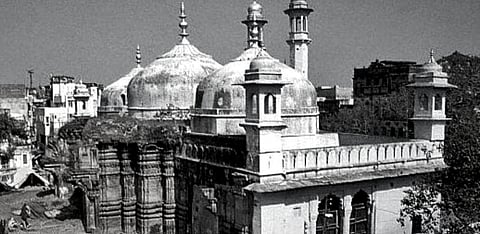

The Places of Worship (Special Provisions) Act, 1991 is being cited in support of the plea for stay of survey.
—–
EARLIER today, a Varanasi court directed the cordoning off of the area on the premises of the Gyanvapi mosque where a shiva linga has allegedly been found.
This comes a day before the hearing at the Supreme Court against the videography survey of the mosque, located next to the Kashi Vishwanath temple.
A division bench comprising Justices D.Y. Chandrachud and P.S. Narasimha will be hearing tomorrow the appeal against the Allahabad High Court's order refusing to interdict the survey of Gyanvapi mosque as directed by the local civil court.
The Committee of Management, Anjuman Intezamia Masjid Varanasi, the appellant in the case, mentioned its appeal on Friday before the Chief Justice of India, who directed it to be listed before a bench presided over by Justice Chandrachud. The appeal contends that the survey of the mosque was an attempt to disturb communal peace and harmony, and is in contravention of the Places of Worship (Special Provisions) Act, 1991.
The appellant has also sought a stay of further proceedings pending before the Court of the Civil Judge (Senior Division), Varanasi.
In August last year, a Varanasi court, in a suit filed by five women, appointed an advocate commissioner to supervise the survey of the Gyanwapi mosque. The order was passed ex-parte. Pertinently, on September 9, 2021, the Allahabad High Court granted a stay on the Archaeological Survey of India [ASI]'s inspection in the suit, which was filed in 1991 on the same issue.
In the appeal, the appellant is contending that the 2021 suit is barred by the provisions of the Places of Worship (Special Provisions) Act.
The Places of Worship (Special Provision) Act was enacted by Parliament to prohibit the conversion of any place of worship and to provide for the maintenance of the religious character of any place of worship as it existed on August 15, 1947 and for matters connected therewith or incidental thereto.
A five-judge Constitution bench of the Supreme Court, in the Ayodhya case in 2019, said that the Places of Worship Act protected and secured the fundamental values of the Constitution. The bench observed:
"The State, has by enacting the law, enforced a constitutional commitment and operationalized its constitutional obligations to uphold the equality of all religions and secularism which is a part of the basic features of the Constitution. The Places of Worship Act imposes a non-derogable obligation towards enforcing our commitment to secularism under the Indian Constitution. The law is hence a legislative instrument designed to protect the secular features of the Indian polity, which is one of the basic features of the Constitution".
The bench had added, "In providing a guarantee for the preservation of the religious character of places of public worship as they existed on 15 August 1947 and against the conversion of places of public worship, Parliament determined that independence from colonial rule furnishes a constitutional basis for healing the injustices of the past by providing the confidence to every religious community that their places of worship will be preserved and that their character will not be altered".
Section 5 of the Places of Worship Act, however, exempts from the application of the Act's provisions the place of worship commonly known as Ram Janma Bhumi –Babri Masjid, and to any suit, appeal or proceeding relating to it.
The appeal in the Supreme Court contends that the proceedings being sub-judice at the High Court, the new suit filed in 2021 is an abuse of the process of law.
"In the Suit of 1991, an application was filed by the Plaintiffs therein for a survey of premises in dispute by the ASI, which though allowed by the Court was later set aside by a coordinate bench of the [high court] vide order dated 09.09.2021, granting a stay upon the aforesaid order as well as further proceedings of the original suit", the appeal reads.
It adds that "it is a settled law that local inspection or Commission by the court is made only in those cases where on the evidence led by the parties, Court is not able to arrive at a just conclusion either way or where the court feels that there is some ambiguity in the evidence which can be clarified by making local inspection or Commission. It cannot be claimed as a right by any party".
It also argues that the Advocate Commissioner for local inspection could not have been appointed upon the suggested choice of the plaintiffs.